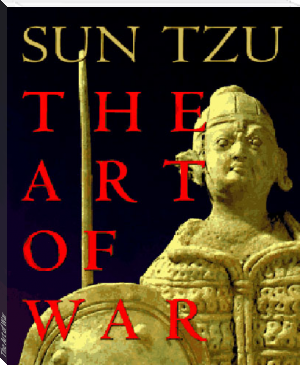The Art of War - Zi Sun (best books to read for success .txt) 📗

- Author: Zi Sun
- Performer: 0976072696
Book online «The Art of War - Zi Sun (best books to read for success .txt) 📗». Author Zi Sun
16. But when the army is restless and distrustful, trouble is sure to come from the other feudal princes. This is simply bringing anarchy into the army, and flinging victory away. 17. Thus we may know that there are five essentials for victory: (1) He will win who knows when to fight and when not to fight.
[Chang Yu says: If he can fight, he advances and takes the offensive; if he cannot fight, he retreats and remains on the defensive. He will invariably conquer who knows whether it is right to take the offensive or the defensive.]
(2) He will win who knows how to handle both superior and inferior forces.
[This is not merely the general's ability to estimate numbers correctly, as Li Ch`uan and others make out. Chang Yu expounds the saying more satisfactorily: "By applying the art of war, it is possible with a lesser force to defeat a greater, and vice versa. The secret lies in an eye for locality, and in not letting the right moment slip. Thus Wu Tzu says: 'With a superior force, make for easy ground; with an inferior one, make for difficult ground.'"]
(3) He will win whose army is animated by the same spirit
throughout all its ranks.
(4) He will win who, prepared himself, waits to take the
enemy unprepared.
(5) He will win who has military capacity and is not
interfered with by the sovereign.
[Tu Yu quotes Wang Tzu as saying: "It is the sovereign's function to give broad instructions, but to decide on battle it is the function of the general." It is needless to dilate on the military disasters which have been caused by undue interference with operations in the field on the part of the home government. Napoleon undoubtedly owed much of his extraordinary success to the fact that he was not hampered by central authority.]
18. Hence the saying: If you know the enemy and know yourself, you need not fear the result of a hundred battles. If you know yourself but not the enemy, for every victory gained you will also suffer a defeat.
[Li Ch`uan cites the case of Fu Chien, prince of Ch`in, who in 383 A.D. marched with a vast army against the Chin Emperor. When warned not to despise an enemy who could command the services of such men as Hsieh An and Huan Ch`ung, he boastfully replied: "I have the population of eight provinces at my back, infantry and horsemen to the number of one million; why, they could dam up the Yangtsze River itself by merely throwing their whips into the stream. What danger have I to fear?" Nevertheless, his forces were soon after disastrously routed at the Fei River, and he was obliged to beat a hasty retreat.]
If you know neither the enemy nor yourself, you will succumb in every battle.
[Chang Yu said: "Knowing the enemy enables you to take the offensive, knowing yourself enables you to stand on the defensive." He adds: "Attack is the secret of defense; defense is the planning of an attack." It would be hard to find a better epitome of the root-principle of war.]
————————————————————————————————-
IV. TACTICAL DISPOSITIONS[Ts`ao Kung explains the Chinese meaning of the words for the title of this chapter: "marching and countermarching on the part of the two armies with a view to discovering each other's condition." Tu Mu says: "It is through the dispositions of an army that its condition may be discovered. Conceal your dispositions, and your condition will remain secret, which leads to victory,; show your dispositions, and your condition will become patent, which leads to defeat." Wang Hsi remarks that the good general can "secure success by modifying his tactics to meet those of the enemy."]
1. Sun Tzu said: The good fighters of old first put themselves beyond the possibility of defeat, and then waited for an opportunity of defeating the enemy. 2. To secure ourselves against defeat lies in our own hands, but the opportunity of defeating the enemy is provided by the enemy himself.
[That is, of course, by a mistake on the enemy's part.]
3. Thus the good fighter is able to secure himself against defeat,
[Chang Yu says this is done, "By concealing the disposition of his troops, covering up his tracks, and taking unremitting precautions."]
but cannot make certain of defeating the enemy. 4. Hence the saying: One may KNOW how to conquer without being able to DO it. 5. Security against defeat implies defensive tactics; ability to defeat the enemy means taking the offensive.
[I retain the sense found in a similar passage in ss. 1-3, in spite of the fact that the commentators are all against





Comments (0)